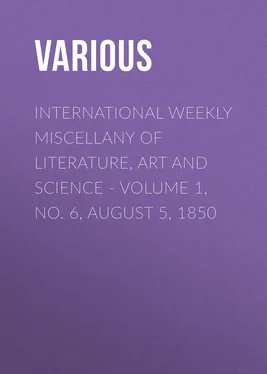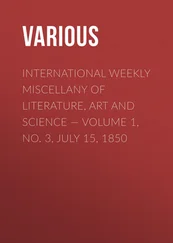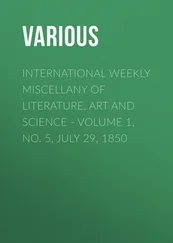Various - International Weekly Miscellany of Literature, Art and Science - Volume 1, No. 6, August 5, 1850
Здесь есть возможность читать онлайн «Various - International Weekly Miscellany of Literature, Art and Science - Volume 1, No. 6, August 5, 1850» — ознакомительный отрывок электронной книги совершенно бесплатно, а после прочтения отрывка купить полную версию. В некоторых случаях можно слушать аудио, скачать через торрент в формате fb2 и присутствует краткое содержание. Жанр: foreign_antique, periodic, foreign_edu, на английском языке. Описание произведения, (предисловие) а так же отзывы посетителей доступны на портале библиотеки ЛибКат.
- Название:International Weekly Miscellany of Literature, Art and Science - Volume 1, No. 6, August 5, 1850
- Автор:
- Жанр:
- Год:неизвестен
- ISBN:нет данных
- Рейтинг книги:3 / 5. Голосов: 1
-
Избранное:Добавить в избранное
- Отзывы:
-
Ваша оценка:
- 60
- 1
- 2
- 3
- 4
- 5
International Weekly Miscellany of Literature, Art and Science - Volume 1, No. 6, August 5, 1850: краткое содержание, описание и аннотация
Предлагаем к чтению аннотацию, описание, краткое содержание или предисловие (зависит от того, что написал сам автор книги «International Weekly Miscellany of Literature, Art and Science - Volume 1, No. 6, August 5, 1850»). Если вы не нашли необходимую информацию о книге — напишите в комментариях, мы постараемся отыскать её.
International Weekly Miscellany of Literature, Art and Science - Volume 1, No. 6, August 5, 1850 — читать онлайн ознакомительный отрывок
Ниже представлен текст книги, разбитый по страницам. Система сохранения места последней прочитанной страницы, позволяет с удобством читать онлайн бесплатно книгу «International Weekly Miscellany of Literature, Art and Science - Volume 1, No. 6, August 5, 1850», без необходимости каждый раз заново искать на чём Вы остановились. Поставьте закладку, и сможете в любой момент перейти на страницу, на которой закончили чтение.
Интервал:
Закладка:
"Now all this is precisely as Miss Fuller would speak it. She is perpetually saying just such things in just such words. To get the conversational woman in the mind's eye, all that is needed is to imagine her reciting the paragraph just quoted: but first let us have the personal woman. She is of the medium height; nothing remarkable about the figure; a profusion of lustrous light hair; eyes a bluish gray, full of fire; capacious forehead; the mouth when in repose indicates profound sensibility, capacity for affection, for love—when moved by a slight smile, it becomes even beautiful in the intensity of this expression; but the upper lip, as if impelled by the action of involuntary muscles, habitually uplifts itself, conveying the impression of a sneer. Imagine, now, a person of this description looking at you one moment earnestly in the face, at the next seeming to look only within her own spirit or at the wall; moving nervously every now and then in her chair; speaking in a high key, but musically, deliberately, (not hurriedly or loudly,) with a delicious distinctness of enunciation—speaking, I say, the paragraph in question, and emphasizing the words which I have italicized, not by impulsion of the breath, (as is usual) but by drawing them out as long as possible, nearly closing her eyes, the while—imagine all this, and we have both the woman and the authoress before us."
ON THE DEATH OF S. MARGARET FULLER.
BY G.F.R. JAMES
High hopes and bright thine early path bedecked,
And aspirations beautiful, though wild,
A heart too strong, a powerful will unchecked,
A dream that earth-things could be undefiled.
But soon, around thee, grew a golden chain,
That bound the woman to more human things,
And taught with joy—and, it may be, with pain—
That there are limits e'en to Spirits' wings.
Husband and child—the loving and beloved—
Won, from the vast of thought, a mortal part,
The empassioned wife and mother, yielding, proved
Mind has, itself, a master—in the heart.
In distant lands enhaloed by old fame
Thou found'st the only chain the spirit knew,
But, captive, led'st thy captors from the shame
Of ancient freedom, to the pride of new.
And loved hearts clung around thee on the deck,
Welling with sunny hopes 'neath sunny skies;
The wide horizon round thee had no speck;
E'en Doubt herself could see no cloud arise.
The loved ones clung around thee, when the sail,
O'er wide Atlantic billows, onward bore
Thy freight of joys, and the expanding gale
Pressed the glad bark toward thy native shore.
The loved ones clung around thee still, when all
Was darkness, tempest, terror, and dismay—
More closely clung around thee, when the pall
Of fate was falling o'er the mortal clay.
With them to live—with them, with them to die—
Sublime of human love intense and fine!
Was thy last prayer unto the Deity,
And it was granted thee by love divine.
In the same billow—in the same dark grave—
Mother, and child, and husband find their rest.
The dream is ended; and the solemn wave
Gives back the gifted to her country's breast.
An Illustration of the high prices paid to fortunate artists in these times may be found in the fact that Alboni, the famous contralto singer, has been engaged to sing at Madrid, at the enormous rate of $400 dollars per day, while Roger, the tenor, who used to sing at the Comic Opera at Paris, and who was transplanted to the Grand Opera to assist in the production of Meyerbeer's "Prophet," has been engaged to sing with her at the more moderate salary of $8000 a month. This is almost equal to the extravagant sum guaranteed to Jenny Lind for performing in this country. It would be a curious inquiry why singers and dancers are always paid so much more exorbitantly than painters, sculptors or musical composers, especially as the pleasure they confer is of a merely evanescent character, while the works of the latter remain a perpetual source of delight and refinement to all generations.
FRASER'S MAGAZINE UPON THE POETS AND POETRY OF AMERICA
The last number of Fraser's Magazine has a long article upon THE POETS AND POETRY OF AMERICA, in which the subject is treated with more than the customary civility of English criticism upon this subject. We are half inclined, indeed, to believe the article was written "above Bleecker," or by an inhabitant of that quarter now in London. Omitting the illustrative extracts, we copy the greater portion of the review, in which most of those who are admitted to be poets are characterized.
"When Halleck said of New York—
Our fourteen wards
Contain some seven-and-thirty-bards,
he rather understated than exaggerated the fact. Mr. Griswold, besides the ninety regular poets in his collection, gives an appendix of about seventy fugitive pieces by as many authors; and bitter complaints have been made against him in various quarters for not including some seventy, or a hundred and seventy more, 'who,' it is said, and probably with truth, 'have as good a right to be there as many of those admitted.' Still it is possible to pick out a few of general reputation, whom literati from all parts of the Union would agree in sustaining as specimens of distinguished American poets, though they would differ in assigning their relative position. Thus, if the Republic had to choose a laureate, Boston would probably deposit a nearly unanimous vote for Longfellow; the suffrages of New York might he divided between Bryant and Halleck; and the southern cities would doubtless give a large majority for Poe. But these gentlemen, and some three or four more, would be acknowledged by all as occupying the first rank. Perhaps, on the whole, the preponderance of native authority justifies us in heading the list with Bryant, who, at any rate, has the additional title of seniority in authorship, if not in actual years.
"William Cullen Bryant is, as we learn from Mr. Griswold, about fifty-five years old, and was born in Massachusetts, though his literary career is chiefly associated with New York, of which he is a resident. With a precocity extraordinary, even in a country where precocity is the rule instead of the exception, he began to write and publish at the age of thirteen, and has, therefore, been full forty years before the American public, and that not in the capacity of poet alone—having for more than half that period edited the Evening Post , one of the ablest and most respectable papers in the United States, and the oldest organ, we believe, of the Democratic party in New York. He has been called, and with justice, a poet of nature. The prairie solitude, the summer evening landscape, the night wind of autumn, the water-bird flitting homeward through the twilight—such are the favorite subjects of inspiration. Thanatopsis , one of his most admired pieces, was written at the age of eighteen , and exhibits a finish of style, no less than a maturity of thought, very remarkable for so youthful a production. Mr. Bryant's poems have been for some years pretty well known on this side the water,—better known, at any rate, than any other transatlantic verses; on which account, being somewhat limited for space, we forbear to make any extracts from them.
"FITZ-GREENE HALLECK is also a New-Englander by birth and a New Yorker by adoption. He is Bryant's contemporary and friend, but the spirit and style of his versification are very different; and so, it is said, are his political affinities. While Bryant is a bulwark of the Democracy, Halleck is reported to be not only an admirer of the obsolete Federalists, but an avowed Monarchist. To be sure, this is only his private reputation: no trace of such a feeling is observable in his writings, which show throughout a sturdy vein of republicanism, social and political. In truth, the party classification of American literary men is apt to puzzle the uninitiated. Thus Washington Irving is said to belong to the Democrats; but it would be hard to find in his writings anything countenancing their claim upon him. His sketches of English society are a panegyric of old institutions; and the fourth book of his Knickerbocker is throughout a palpable satire on the administration of Thomas Jefferson, the great apostle of Democracy. Perhaps, however, he may since have changed his views. Willis, too, the 'Free Penciler,' who has been half his life prating about lords and ladies, and great people, and has become a sort of Jenkins to the fashionable life of New York; he also is one of the Democratic party. Peradventure he may vote the 'Locofoco ticket' in the hope of propitiating the boys (as the canaille of American cities are properly called), and saving his printing-office from the fate of the Italian Opera House in Astor Place. But what shall we say of Cooper, who, by his anti-democratic opinions, has made himself one of the most unpopular men in his country, and whose recent political novels rival the writings of Judge Haliburton in the virulence as well as the cleverness of their satire upon Republican institutions? He, too, is a Democrat. To us, who are not behind the curtain, these things are a mystery incapable of explanation. To return to our present subject. Halleck made his début in the poetical world by some satirical pieces called The Croakers , which created as much sensation at their appearance as the anonymous Salmagundi which commenced Irving's literary career. These were succeeded by Fanny , a poem in the Don Juan metre. Fanny has no particular plot or story, but is a satirical review of all the celebrities, literary, fashionable, and political, of New York at that day (1821). And the satire was probably very good at the time and in the place; but, unfortunately for the extent and permanence of its reputation, most of these celebrities are utterly unknown, not merely beyond the limits of the Union, but beyond those of New York. Among all the personages enumerated we can find but two names that an European reader would be likely to know anything about,—Clinton and Van Buren. Nay, more, in the rapid growth and change of things American, the present generation of New Yorkers are likely to lose sight of the lions of their immediate progenitors; and unless some Manhattanese scholiast should write a commentary on the poem in time, its allusions, and with them most of its wit, will be in danger of perishing entirely. What we can judge of in Fanny are one or two graceful lyrics interspersed in it, though even these are marred by untimely comicality and local allusions. The nominal hero, while wandering about at night after the wreck of his fortunes, hears a band playing outside a public place of entertainment. It must have been a better band than that which now, from the Museum opposite the Astor House, drives to frenzy the hapless stranger.... In Halleck's subsequent productions the influence of Campbell is more perceptible than that of Byron, and with manifest advantage. It may be said of his compositions, as it can be affirmed of few American verses, that they have a real innate harmony, something not dependent on the number of syllables in each line, or capable of being dissected out into feet, but growing in them, as it were, and created by the fine ear of the writer. Their sentiments, too, are exalted and ennobling; eminently genial and honest, they stamp the author for a good man and true,—Nature's aristocracy.... For some unexplained reason Halleck has not written, or at least not published, anything new for several years, though continually solicited to do so; for he is a great favorite with his countrymen, especially with the New Yorkers. His time, however, has been by no means passed in idleness. Fashionable as writing is in America, it is not considered desirable or, indeed, altogether reputable, that the poet should be only a poet. Halleck has been in business most of his life; and was lately head-clerk of the wealthy merchant, John Jacob Astor, who left him a handsome annuity. This was increased by Mr. Astor's son and heir, a man of well-known liberality; so that between the two there is a chance of the poet's being enabled to 'meditate the tuneful Muse' for the remainder of his days free from all distractions of business.
Читать дальшеИнтервал:
Закладка:
Похожие книги на «International Weekly Miscellany of Literature, Art and Science - Volume 1, No. 6, August 5, 1850»
Представляем Вашему вниманию похожие книги на «International Weekly Miscellany of Literature, Art and Science - Volume 1, No. 6, August 5, 1850» списком для выбора. Мы отобрали схожую по названию и смыслу литературу в надежде предоставить читателям больше вариантов отыскать новые, интересные, ещё непрочитанные произведения.
Обсуждение, отзывы о книге «International Weekly Miscellany of Literature, Art and Science - Volume 1, No. 6, August 5, 1850» и просто собственные мнения читателей. Оставьте ваши комментарии, напишите, что Вы думаете о произведении, его смысле или главных героях. Укажите что конкретно понравилось, а что нет, и почему Вы так считаете.












